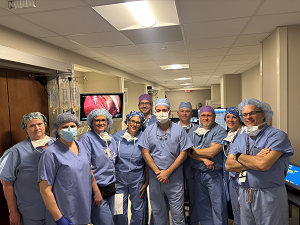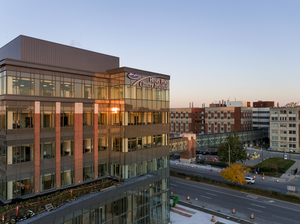Thriving and Surviving- A Blood Cancer Support Group
This monthly virtual support group is open to all Henry Ford patients who have been diagnosed with a blood-related cancer, whether currently in...
The liver is a football-sized organ located in the abdomen that filters blood from other parts of the body. Our team includes doctors, nurses, dietitians, psychiatrists, and social workers, all of whom are here to meet the physical and emotional needs of liver cancer patients and their families.

Liver cancer affects both men and women, but men are more likely to have it. All races/ethnicities are affected. Non-Caucasian people are more commonly diagnosed at an advanced stage of the disease.
The most common risk factors include:
While hepatitis B, hepatitis C, and alcohol related liver disease are the most common risk factors, fatty liver disease due to obesity is a growing cause of liver cancer.
Some people falsely believe liver cancer always is caused by excessive alcohol use. This is untrue -- a variety of factors can cause liver cancer. But heavy alcohol use is a risk factor for liver cancer. Studies have shown that heavy alcohol consumption over time can increase the risk of liver cancer significantly.
Liver cancer is typically asymptomatic (meaning no symptoms are present) until patients develop advanced stages of the disease. However, once the cancer has grown large enough, it can cause a number of health conditions, including:
If you experience any of these symptoms, you should see a doctor. People with a history of chronic liver disease or cirrhosis should be routinely checked for liver cancer.
Our doctors treat all forms of liver cancer. The four main types of liver cancer are:
We diagnose liver cancer with a variety of medical tests, including:
There are many treatments for liver cancer, and if diagnosed early, treatment is often successful.
Beyond treatment, we provide a range of education and support options to all our cancer patients.
This monthly virtual support group is open to all Henry Ford patients who have been diagnosed with a blood-related cancer, whether currently in...
Join us each Tuesday for Open Studio, a free-of-charge art therapy group available to cancer patients and survivors where you can spend some...
Join us each Tuesday for Open Studio, a free-of-charge art therapy group available to cancer patients and survivors where you can spend some...
While the use of meditation and breathing exercises are not an alternative treatment or cure for cancer, they have been shown to help people with...




We use cookies to improve your website experience. By using this site, you agree to our Terms of Use. Read our Internet Privacy Statement to learn what information we collect and how we use it.